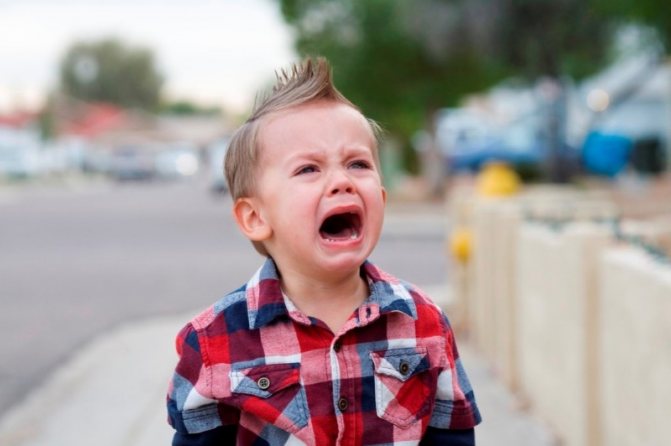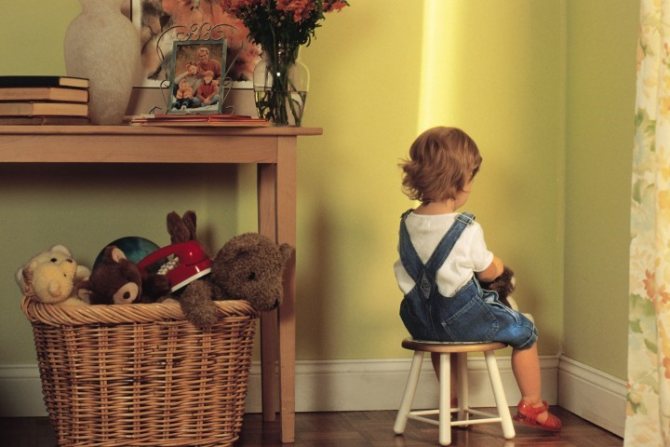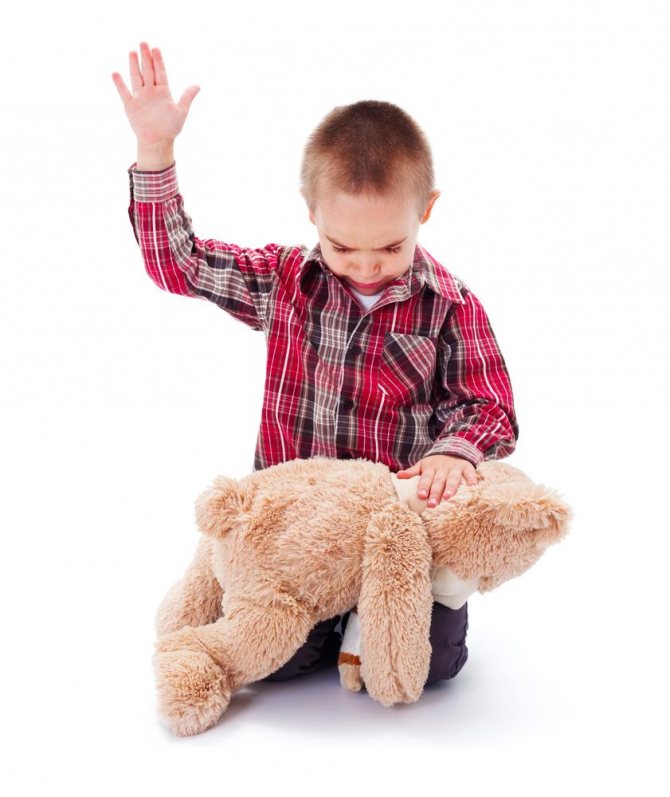Is it possible to punish children?
Many mothers and fathers are pondering the question of whether it is possible to punish children.
Some parents still consider punishment with a belt to be a normal method of education. Others dream of raising their beloved child without ever being punished. With a high degree of probability, in the first case, the baby will grow up insecure, with the feeling that no one loves him. In the second, the child will not know the boundaries between good and evil, his own comfort and the pain of others. However, it is necessary to find a middle ground, because according to psychologists, competent punishment preserves parental authority and forms in the child a sense of responsibility and boundaries of what is permitted.
So how to punish a child correctly so that the psyche is not damaged, and the child, during educational sanctions, remains in full confidence that his parents still love him?
How to punish a child without causing injury
Let me remind you that punishments are applied at the third level of boundaries, which I call the “rubber wall”. At this level, parents set strict rules that cannot be broken and impose sanctions if the child crosses these boundaries. You can read more about the 4 levels of boundaries in the article “A child is rude: how to stop bad behavior .
Educational punishments can be of the following types:
- natural and logical consequences - a popular modern method, which, however, has its own nuances. This is the only method that we can use up to 2.5 years. According to his principle, we confront the child with the consequences of his actions: for example, if he spills water, he must clean it up. Or even simpler: if the baby bites the breast, then we take it away and do not allow ourselves to be bitten. In this way, cause-and-effect relationships are formed in the child’s mind. But the downside is that, firstly, the child cannot always understand these connections, and, secondly, understanding these connections, he cannot always stop himself at the right moment!
- The points and penalties system is a very effective method, especially if used in conjunction with the chip system. For example, when you set up a motivation board so that a child “earns” chips for learning skills (behave politely and get a prize), it makes sense to introduce fines as well. For example, if a child sticks out his tongue, he will lose one “chip” and will have to earn it again. The main thing is that the rules are agreed upon in advance and the child understands the possible consequences of his actions.
- deprivation of privileges - this method can be used when a child is lazy, procrastinates, is rude, behaves aggressively, or does not perform household duties. According to this method, we deprive our rule-breaker of those activities that bring him pleasure. This could be time for computer games, watching cartoons, going to the cinema or visiting, playing with friends. It is important that the deprivation of benefits occurs soon after the child has misbehaved.
- time-out method - I propose to consider this method separately so that you know in detail how to apply it.
Time-out method, step-by-step instructions:
When a little troublemaker doesn’t listen, warn him that he will soon be punished and go to the “penalty chair.” This is a place where you can't socialize or play, but you can think about your behavior, live and let go of anger, and recognize restrictive rules. How to implement the method step by step:
- Think over the methodology. Under what conditions is a child sent to a chair? Take age into account. For example, if a child says bad words or continues to fight after a remark.
- If a child breaks a rule, reprimand him.
- If the child continues to misbehave after your remark, start counting out loud from 5 to 1 with the words: “On the count of 1 you will stop” - this way we give the child a chance to stop. A very effective option!
- Did not help? Looking into your eyes, say: “If you continue... you will sit in a penalty chair!”
- Start counting from 5 to 1 again.
- It didn’t help, so go to the chair. We sit for at least as many minutes as the little one is old. If he can’t sit still, you can hold him by the shoulders and bring him back if he leaves his seat. After all, he cannot leave the punishment zone on his own. “You will stay here until I give you permission to get up!” The baby screams, gets angry, throws things - this is acceptable. By the time he comes out of the “time out” he will calm down.
The most important thing, when the time is up, is to ask the child: “Are you ready to do what I asked?” If the situation can no longer be corrected (an offensive word cannot be changed), then he must promise that it will not happen again. After that, say: “Well done! Thank you for doing what I asked.”
“Time-out” should be used with caution (and only after preliminary consultation) to children with a neurological condition and those who are unable to calm down on their own. Do not use this method if you are not ready to implement it and are afraid of children's protest.
Many mothers are left with the question: how to properly punish young children, up to 2.5 years old?
The answer is simple: no way. It is incorrect to punish at such an early age. The child’s level of self-control makes this technique ineffective, not to mention the emotional side of the issue. Whatever the power of the words of mom and dad, they may still not be enough for the child to stop himself. He needs supervision, control and help from adults: walk away from highways, hold his hand tightly, repeat “the right way” over and over again, monitoring the correspondence of your words to your actions. If you have forbidden something in words, then you need to make sure that what you want is really not available.
However, even such babies can be taught to stop at their mother’s request. In the form of a game.
For this I recommend the game “Stop”.
When the mother says the word “stop,” the baby must stop, freeze, wherever he is. You can train at home to music with or without chairs; the options for creativity are endless. Children love this game very much and quickly learn the rules, although this does not eliminate the need for your supervision.
Don't miss when the little one behaves well, praise him! In general, you need to try to ensure that there is more positive communication with your son (daughter) than criticism, moralizing, and reprimands. This way he will understand: you are not angry with him, but with his actions; disobedience, outbursts of aggression, hysterics and whims are not associated with the child’s personality, but are just temporary companions of growing up, which can and should be dealt with.
If you want to learn more about using sanctions as a teaching technique or how to do without punishments altogether, I recommend my master class “Punishments: Pros, Cons and Alternatives .
By purchasing it, you receive:
- a guide to the 4 Levels of Boundaries to help you clearly identify situations where punishment is necessary and where other methods are needed;
- A 2-hour master class that describes the types of non-violent punishment, when and how to use them;
- analysis of complex cases: what to do if a child does not want to sit in a penalty chair and others;
- stop card of prohibited techniques in punishments;
- checklist of what to do if a child breaks the rules;
- Reminder on the time-out method.
Punishment and its use is a very important topic in raising children, but we know so little about civilized methods of discipline. After all, in our childhood, parents had only two tools: the carrot and the stick... But I believe that you are a modern mother who wants to remain an authority for the child, without losing intimacy and trust in the relationship with him.
To learn more about the master class and learn new methods in education, follow the link:
At what age can you punish a child?
Another common question from parents is at what age can a child be punished. It is generally useless to fine children under two or three years of age, because they do not understand the connection between what happened and its consequences. But from the age of three, mom and dad are faced with the first scandals and misunderstandings on the part of the baby. Therefore, disciplinary measures can begin to be introduced at this age.
Elena Ostrovskaya, psychologist, leader of parent-child groups
Punishment is not such a terrible thing as is commonly thought: sometimes it is necessary for raising a child. But they are applicable to children over three years old (most likely for children 5 years old and older). Moreover, you cannot punish just like that, because of a bad mood. Punishment follows a serious offense, a violation of some rules. The child must know: there is a clear and undeniable system of rules (these rules must be clear to the child and agreed upon in advance). If he violates them, then the parent has the right to take action. Discuss with your child what you consider unacceptable in his behavior. No threats or scandals. You need to punish by depriving the child of something good, and not by doing something bad to the child.
But here's the thing: at the age of three, a child will not understand what rules you are talking about. And the situations themselves when he behaves badly can be divided into two groups:
- He is still too young and his whims are not a desire to piss off his parents, but rather a cry for help. He is probably tired, nervous, or unable to cope with any task.
- There is another option - through his hysteria, the child tries to protect his own boundaries, defend his interests and values.
When you spank a three-year-old, you are telling him that domestic violence is normal. And that he may not expect help from his parents. Sending him to a corner means we refuse to make contact. The baby begins to feel a lack of care and love and withdraws into himself. This threatens psychological problems in the future.
Imagine how the child feels then: he is abandoned, unloved, bad...
But parents should not forget about themselves. Tell your child: “We respect you, but you must respect us too.” That is, bad behavior cannot be ignored. If a child throws stones at passers-by, you need to take the child aside and remind him of the existing rules, tell him that he is disturbing you and the people around him. Also, do not give in to manipulation by buying your child toys and chocolates. Naturally, the baby will cry, freak out and protest, because you are drawing a boundary that he cannot cross. Stand your ground, but do it without aggression or malice. Don't brush your child off; he really needs your support.
READ ALSO ON THE TOPIC OF PUNISHING CHILDREN
- Should I punish my child for random misdeeds or not? –
- What should parents not do when their child behaves unbearably? –
- Why you shouldn't spank a child - 6 reasons -
- How to raise children: carrot or stick? –
- 8 loyal ways to punish children. How to properly punish a child for disobedience -
- 7 blunders of parents during quarrels with children -
- How not to punish a child -
Reasons for child disobedience
The baby may not know that he is doing something wrong. For example, if he is five and takes a bill from an adult’s wallet, this does not mean theft at all. The child simply repeats the actions of the people around him.
Mom and dad are the first to set the rules in the baby's life. Very often a child wants to test the boundaries of what is permitted: what will happen if I do it differently? This often happens in families where parents are not constant in their demands. Yesterday a child could watch TV for half a day, today he is not allowed to spend 10 minutes on his favorite cartoon.
The child wants to attract the attention of his parents in any way: “It’s better for mom to scold than to behave as if I don’t exist.”
Why you should not punish a child
You cannot punish for showing emotions: resentment, anger. Even if a child broke a cup in their hearts, it should be said that in our family it is not customary to break dishes. You should not try to stop children's tears at any cost. Baby crying is a release of stress hormones. If you forbid a child to cry in childhood, he will not be able to express feelings in adulthood.

General principles of correct punishment
Many parents will be interested in learning how to discipline a child.
Punishment is the consequence of violating agreed rules that the child was aware of in advance. Punishment is aimed at helping the child understand himself and the situation, and try not to repeat the mistake. When punishing a child, parents should approach the process with a cool head. The rule: “count slowly to 10”, “go into another room and calm down yourself” has its place. At the same time, if possible, the heart should remain “hot”, in other words, punish your beloved child “with love in your heart.” Children can often survive any parental punishment, but most of all they are afraid of their mother’s evil gaze.
With any punishment, the child must be confident that the action was fair and, most importantly, that his parents still love him.
The ancient way of putting a child in a corner for educational purposes is not the best option. Standing in tension, it is difficult for the baby to relax and think carefully about the action. It is better to seat the child separately from the group at the other end of the room.
Try not to set too many restrictions. It is enough to ask the child to do his homework on time, to monitor the cleanliness of the room and his own hygiene. Let's have more freedom for creativity and independent decision-making: what to eat for breakfast, what clothes to wear for a walk. The main thing is that the opinions of parents are united.

Consultation for parents “How to properly punish a child”
“How to properly punish a child”
A child whose parents beat him for the slightest offense, threaten to give him away to an evil uncle, force him to stand in the corner for hours, or organize silent boycotts, as a rule, is doomed to an unhappy childhood. Such a baby will almost certainly suffer from low self-esteem, distrust of the world, and the feeling that he is superfluous and unloved. In fact, such punishment of children has nothing to do with the educational process. This is banal cruelty.
The other extreme is no better - complete permissiveness. If a child is sure that he can do anything and nothing will happen to him for it, then he does not distinguish the boundaries between good and evil, between his own pleasure and someone else’s pain. And no matter how strange it may seem at first glance, such a child also often feels unwanted and unloved by his parents.
Punishment is necessary - in some cases, only this method allows the child to feel the boundaries of what is permitted, maintain parental authority and instill responsibility in him. The question is: what should you punish for, how to do it, and how to let your child know that you still love him.
Why don't children listen?
In order to understand what is possible and what is not, the child needs to test the strength of the boundaries surrounding him, in particular the limits of parental authority and patience (after all, it is mom and dad who set the first rules in a child’s life). So children's disobedience is often caused by the desire to find out: “What will change in the world if I do this or that?” or “I know that you can’t do this, but maybe if you really want to, then it’s possible?”
Especially often, children whose parents are inconsistent in their demands explore the boundaries of what is permitted (for example, yesterday they were allowed to play on the computer for half a day, but today for some reason they are not). Such kids simply do not know for sure what they can and cannot do.
It happens differently. Sometimes a child behaves as if he set out to “get” his parents. In a sense, this is true, although the baby’s motives are different than adults imagine.
“Children (especially preschoolers) do not do anything out of spite, out of a pure desire to cause pain to others,” notes family psychologist Svetlana Roiz. – Does the child deliberately dig around for a long time when he needs to quickly get ready for kindergarten, or deliberately throws a bowl of porridge onto his sweater? He doesn't do this to offend mom or dad. Often, rebellious behavior is a clumsy attempt to attract attention.
Unconsciously, the child is guided by the following motive: “It would be better for my mother to get angry and spank me than to act as if she does not notice my existence at all.” If the baby lacks parental warmth and involvement, bad behavior may be the only opportunity to evoke a strong emotional reaction in mom or dad.”
Artificial toys make children uncontrollable
Another reason for children's disobedience is nervous overstrain. Modern children are overloaded with an abundance of information. These include all kinds of early development clubs and aggressive cartoons (computer games). After spending just a few hours watching virtual monsters, the child becomes hyperexcitable and cannot be calmed down and put to bed in the evening.
Raising and punishing a child: each age has its own approach
Soft exhortations and explanations do not always lead to the desired result. Sometimes only through punishment can a child learn certain rules and norms of behavior.
“An important nuance: punishment is a consequence of breaking a rule that the child knew about in advance,” says Svetlana Roiz. - In other words, you cannot punish a child for stealing a toy from his friend, if you have not previously explained to him that you cannot take other people’s things without asking. It is important that the parental reaction is adequate to the offense and the age of the child.
For example, until the moment the baby begins to say “I” about himself (usually this happens at 2-2.5 years), he does not correlate the punishment with his personality. The hippocampus (part of the brain), responsible for our biographical memory, begins to actively work only in the third year of life. Only from this time on is the child able to remember that this or that offense leads to punishment. Of course, this does not mean that the baby should be allowed to fight and pinch. But it simply doesn’t make sense to punish a two-year-old toddler for this. Stop the child’s hand, gently switch his attention to something else.”
“Until about five years of age, a child’s actions are primarily imitation,” adds Valentina Antoshchenko. – If a three, four or five year old child, for example, took money out of your wallet, this does not mean that he stole it. Most likely, he is simply copying what he saw somewhere. Not necessarily in the family (although most often children “mirror” the behavior of their parents) - perhaps he saw a similar scene on TV or on the street. Just think: where and from whom could the baby borrow such a style of behavior?”
How to punish a child without harming his psyche: important rules
The purpose of punishment is to help the child understand himself and the current situation and, if possible, avoid repeating the mistakes made in the future. In order for punishment to have exactly this effect, it is necessary, regardless of the child’s age, to follow a number of rules.
- Cool head...
When you punish your son or daughter, you yourself should not seethe with emotions. Of course, this rule is not always easy to implement in practice. Methods like “count to ten” and “go into another room and calm down” really work. First, deal with your own feelings and only then take any action.
- ...and a warm heart
In the Slavic tradition, there has long been a rule: when punishing their children with rods, parents mentally placed their hearts filled with love in front of the baby. And despite all the unpedagogical nature of spanking, the children perceived such punishment as fair. We under no circumstances encourage you to use physical measures.
How to properly punish a child But it’s good if the attitude “with love in the heart” becomes the fundamental motive for any of your actions towards the baby (including punishment). These are not just beautiful words, and the experience of a practicing psychologist confirms this. “When little children are brought to see me and the conversation turns to punishment, many little ones say that the worst thing for them is not a belt, standing in a corner or being deprived of some pleasure, but... their mother’s evil eyes.”
With any punishment, the child must be sure that he is being treated fairly, that he is still loved, and that even if he is punished he will not be left without parental love.
- Ask yourself a couple of questions
Two mini-tests will help you calm down the flurry of emotions and choose the right course of action. If you feel like you're about to snap, stop and ask yourself: “Why am I doing this? From powerlessness? Tired? Irritation with your husband? Second test: imagine that in the place of your son or daughter: a) someone else’s child; b) an adult who is significant to you - husband, mother or girlfriend; c) yourself. Would you allow yourself to do as you intend in this case?
- Action, not personality
Criticize bad behavior, not the child himself. Say: “I am punishing you for calling other children bad names.” Avoid unflattering characterizations of your son or daughter (slob, lazy, bad child).
- The child must know why he is being punished
It should be clearly stated to the child what exactly led to the punishment. Remember: you cannot punish for feelings (for the fact that the child is offended, angry, etc.), because each of us has the right to any experiences. Another thing is how we express these feelings. For example, the baby got offended or angry about something and threw the plate on the floor in anger. You can say: “I understand that you were offended, but damaging property in our family is not allowed.” Do not try to stop children's tears at any cost. After all, crying is a natural release of emotions and stress hormones. And it’s good when there is this way out! Psychologist Liz Burbo states: “Uncryed tears can lead to chronic runny nose and even sinusitis.” Additionally, if you don't allow your baby to cry when he wants to, he may have serious problems expressing his true feelings in the future.
- Time frame
It is important that the child knows how long the punishment will last. The wording “you won’t get any more sweets” or “from now on you won’t watch cartoons” is absolutely unacceptable! The kid may decide that the ban applies to his entire future life - you must agree, this is too harsh and, moreover, unrealistic. And then, when after some time you forget about what happened and treat your baby with a treat or turn on his favorite cartoon, your parental authority in his eyes may be shaken.
- Ritual of reconciliation
Develop some symbolic action that will mark the end of the sentence. This could be, for example, a children's rhyme: “Make peace, make peace, make peace and don’t fight anymore!” By the way, it’s not without reason that children interlace their little fingers when making peace: on the little finger there are biologically active points directly connected to the heart!
Prohibited techniques: how not to punish a child
There are taboos in matters of punishment. Whatever the child’s offense, do not under any circumstances allow yourself to humiliate or intimidate the child. It is unacceptable to deprive the baby of satisfying his physiological (today you go to bed without dinner) and emotional (I’m not talking to you now) needs. Ignoring is perhaps the worst form of punishment for a child. In this case, the parent seems to be sending a message to the child: “You don’t exist for me, you have no place in my life.” You can’t threaten a child: “If you behave badly, I’ll give you to grandma” (the little one perceives this as “I don’t need you”).

The Hungarian writer and psychologist Domokos Varga wrote in his book “The Joys of Parenthood”: “I would like to warn parents against a pre-announced spanking. Still, sometimes it would be a good idea to slap a child on the butt in hot pursuit, if there is no other way to cope with him. Forcing a child to wait, to suffer, to imagine the process of punishment again and again is already premeditated cruelty.”
Putting a child in a corner is also not the best option. After all, in a standing position, the baby is in tension, which means he cannot relax and calmly think about his offense and find a way out of the situation. Much more effective is the method adopted in the Waldorf kindergarten where Valentina Antoshchenko works: “When one of the kids starts playing naughty, I say: “Please go, sit on the sofa in the far corner of the playroom.
And when you calm down, come to me and tell me.” Time passes, the child comes up and says: “I know what needs to be done now.” - "What?" - “Apologize” (collect scattered toys, help the nanny clean up spilled soup, etc.). This method allows, on the one hand, to neutralize the naughty child, and on the other, gives the child a chance to figure out the situation himself.
Agree, this skill is much more valuable than the habit of acting according to a template invented by someone.”
Punish without witnesses
It is better to punish the baby in private. Firstly, it does not harm the baby’s self-esteem. And secondly, if you punish one child in the presence of another, then the little one who is watching what is happening also suffers. He receives an even greater charge of aggression than the guilty person, to whom educational sanctions are applied. Of course, this will affect his psycho-emotional state.
Behavior and punishment: playing by the rules
Agreeing in advance is always better than “resolving” a conflict that has already occurred. In order for peace and harmony to always reign in the family, it is necessary to establish certain rules of behavior.
- Minimum prohibitions
There shouldn't be too many restrictions. They should concern only those moments that are really important to you in the behavior of children (washing your hands before eating, making the bed in the morning, saying hello, not picking your nose, etc.). Try to provide freedom where possible. The child can easily decide for himself which toy he will take with him to kindergarten and what color blouse he will wear today.
- Common standards
It is important that you and your husband have the same requirements for the child. And be prepared to maintain the boundaries of what is permitted and apply sanctions if they are violated.
- One rules for everyone
The rules must be followed by all family members. You cannot demand from your child not to eat in front of the TV if you and your husband do it.
- Creativity
Together with your child, draw “reminders” on sheets of paper regarding the most important rules. For example, you can depict a cup with legs heading towards the sink and hang this design above the dining table. After eating, all you have to do is point to the poster and your baby will remember to take the dirty dishes to the sink.
- Flexible system
The rules should be reviewed and adjusted from time to time, because they are not designed to control your life, but to make it easier and more enjoyable!
Photo in text: Depositphotos
Is physical punishment acceptable?
In no case should you use physical restrictions as punishment: “you’re going without lunch today” or emotional ones: “I’m not talking to you.” Ignoring and indifference on the part of parents is the worst punishment for a child. He feels useless to anyone.
Methods of punishing a child should not be physical. By showing aggression on your part and beating your own child, you cause him serious mental and physical trauma. The consequences of physical impact in a child can be aggressiveness, the desire to rebel and take revenge. By raising your hand to your child, you are destroying your family.
Despite the child’s misdeeds, sometimes think about whether children should be punished. Remember yourself as a child. You yourself probably behaved imperfectly as a child. Therefore, put yourself in the child’s shoes before punishing him. Change the rules from time to time, because they are not designed to complicate our life, but to make it more comfortable.









